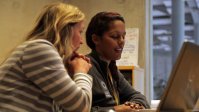Informal Learning: From STEM Clubs to Careers in Science
Follow Mariah’s journey from informal learning as a kid with a passion for science to a young adult on a STEM career path.
I have always had a special enthusiasm for learning. I remember waking up extra early for school in third grade so that I would not miss a word of our morning homework review. It wasn't until seventh grade that I gained a certain zeal for the sciences. I loved lab days and could not wait to present research projects to the rest of my class.
So when my seventh grade science teacher asked us, "Who wants to participate in the after-school science club?" -- my hand shot up into the sky. I danced in my chair until a flyer for the California Academy of Sciences' Science Action Club landed on my table. Science Action Club is an after-school program that takes place at San Francisco middle schools, aimed toward getting middle schoolers involved with science outside of the classroom. Among other fun activities, youth are given the opportunity to participate in authentic scientific research, just like you saw in the video above.
After the first Science Action Club meeting, I was hooked. The club provided me with hands-on, relevant learning. In school, I often wondered how important all of our work really was. I would sit and ask "How is this going to help me in the real world?" or "When will I actually need to know all of this?" For me, Science Action Club answered those questions.
It is one thing to be told, "Researchers recorded data because it is an important part of their studies" or "Coleopterists study these beetles." And it is another thing to be handed a net and told to go out and collect the beetles yourself. I realized that learning can be more than getting a lecture and answering questions about it. I was shown that you can experience learning outside of the classroom and on your own.
From Club to Career
Two years passed in the Science Action Club when I heard about another youth program at the California Academy of Sciences, called Careers in Science. By this time, I had realized that science was what I wanted to do with my life. That same science teacher I had in the seventh grade gave me an application and said that this was a program that I might be interested in. "Teach, Learn, and Conduct Science" was spelled out in bold at the top of the flyer. I was thrilled.
Careers in Science is an intensive, multi-year program aimed at supporting underrepresented youth to enter the science community. I was told that interns teach on the public floor, go on trips, and get training from actual scientists who work at the Academy. This program sounded too good to be true, so I eagerly applied. And when I got the call that I was accepted, I was squirming in my chair with excitement yet again.
As an intern, I have been given the opportunity to participate in a variety of "project groups" taking an in-depth look into specific STEM fields that interest us. These groups are made up of three to six youths working together on a specific project.
What makes the Academy youth programs special for me is how unrestricted we are. The programs give me a glimpse into the real world and make a career in science seem attainable and a likely possibility for me in the future. We help our peers around the world consider and debate about something that we think is important. That is something that I could not do anywhere else. Some examples of topics that we wrote about include e-cigarettes, sexism in the science community, and nature versus nurture.
Informal Opportunities
In regular school, we are all expected to work in the same way. We are all tested, graded, and evaluated the same. We are given lessons and then told to move on. Some young people thrive in school, while others find it hard to stay interested.
I think that if everyone had the chance to experience informal education, our world would be in better shape. I feel that if everyone got to develop the same passion for learning that I did, through after-school clubs in something they care about, kids would be less likely to drop out. And staying in school gives them a chance to better the world.
For someone like me who grew up in a hardworking, single-parent home in the middle of San Francisco, the thought of becoming a scientist is not something that would ordinarily seem reachable. But now I know it is. For that reason, and many more, I am thankful I raised my hand that day in my seventh grade science class.
